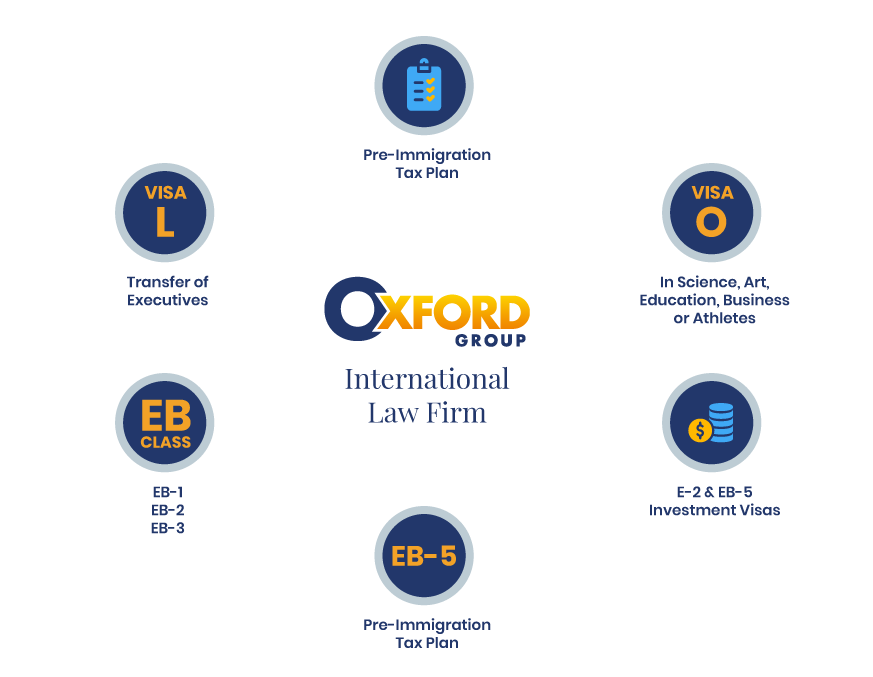SERVICES
Immigration
There are more than 140 types of visas for the United States. It is essential to evaluate the best type of Visa based on the needs and perspectives of each case.
Visas for all needs
It is essential to carry out a previous tax planning to analyze the implications of each type of visa.
The most common visas are those for work, investment and special skills. Not all involve a permanent residency process.

Travel. Work. Study. Invest.
There are dozens of different types of visas in the United States, divided into several categories. Here we summarize the most common.

Pre-immigration Tax Planning
Before starting any visa application it is essential to analyze the tax aspects based on the situation and needs of each person.
It will also be necessary to consider the implications of employment alternatives and their taxes, that of temporary, permanent residence and or only obtain a work permit.

L Visa – Transfer of executives
L1A Visas are granted to be able to transfer high-level officials to be able to work in a new or existing related company in the United States.
- The company must be solid and stable in its country of origin, and demonstrate the ability to cover the expenses generated by its subsidiary in the United States until it can be maintained financially autonomously.
- The company in the country of origin must continue to operate during all this time.
- A business plan must be prepared for the subsidiary in the United States establishing its goals and development plan. This plan must be approved and fulfilled.
- The North American subsidiary must hire and generate between 5 and 8 direct jobs with North American employees during its first year of existence. It is expected that it can add more jobs as it evolves favorably.
- Three levels of personnel to be transferred are considered: Chief Executive, Director and Functional Manager.
- The subsidiary in the United States must have an operating premise, whether own or rented.
- This type of visa can usually be granted for one year and can be renewed for up to two additional years. The maximum period of permanence is 7 years.
- This type of visa covers the holder and his family, with minor children. They lose the right when they turn 21.

O Visa – Special
O-1 Visas are granted to individuals with extraordinary abilities who wish to immigrate to the United States.
They do not require a sponsor or a job offer.
They are granted temporarily, with a validity of 3 years, renewable. Does not grant permanent residence (Green Card).
O-1B Visas are similar to O-1 Visas but apply to people of extraordinary talent in the arts, television, or film industry. It is a fundamental requirement to demonstrate their success, talent and validity.
A temporary visa is granted for 3 years, renewable. Does not grant permanent residence (Green Card).
EB-5 Visa
Investor Visa

EB-5
EB-5 Visas were established in 1993 with the purpose of attracting foreign investors to generate development and employment.
In consideration for the investment and development of the enterprise, the Government grants permanent residence (Green Card)to the investor and his immediate family, including his minor children. The U.S. Congress debates and renews these initiatives annually.
In essence, it is required to meet the following requirements:
- Minimum investment of $900,000 to be made in a “designated area”.
- Generate and maintain at least 10 permanent jobs.
- Duly certify the legal origin of the funds.
- Have no problems or legal background in the United States or in the country of origin.
- Submit a business plan that is approved by the authorities.
The “designated area” (TEA) in general is a rural or non-rural area with a higher unemployment rate vs the national average according to the last census carried out.
The venture to be carried out can be from scratch, or incorporating the investment into a business in progress. The investor must define whether he will take charge leading the venture or if he will be a passive shareholder.
In case of entrepreneurship in a “premium” zone, and NOT of development designated by the government, the investment required is $ 1,800,000.
The benefit of residency is granted conditionally initially for 4 years. If the venture fails, the benefits of permanent residence are lost
There are many law firms that offer their services to process these investor visas. It is very important to investigate its suitability and carry out a meticulous work to select the venture to be carried out (whether own and new, that is, participating in an ongoing one) to minimize the risks of failure and ensure its continuity and future return on investment. It is very important to properly prepare the case by requiring this type of Visa, presenting all the documentation, the business plan, to avoid future problems.
In mid-2021, a temporary amendment was made to the regulations for this type of Visa, requiring a minimum investment of $ 500,000. That amendment is no longer in force and a new regulation by the competent authorities is awaited, possibly by October 2021.

E-2 Visa – Visa for Investors of countries with a trade agreement with the US
E2 Visas are granted to citizens whose countries have commercial cooperation treaties with the United States in force.
Most countries in Europe and some in Latin America have these agreements in force (Brazil, Colombia and Peru do not have this agreement in force).
It is a type of Visa similar to the EB-5, with lower investment requirements, which allows you to live and work in United Stadiums, WITHOUT having permanent residence. It protects the investor and his family with minor children (they lose the benefit when they reach the age of majority). Valid between 2 to 5 years, renewable for another 2, as long as the company continues to operate.
The general requirements are as follows:
- Be a citizen of a country with a specific commercial agreement for E2.
- Invest a significant sum in a new or ongoing business in the United States (starting at $150,000).
- Have a minimum of 50% stake in the company.
- Generate a minimum of 3 jobs.
- Demonstrate experience and suitability to manage the company and be directly involved in the management of the company.
- Certify the origin of the funds.
- Submit a business plan.
It is very important to carry out this management with a specialized study, since it is required to carry out a meticulous work to select the venture to be carried out (whether own and new, that is, participating in one in progress) to minimize the risks of failure and ensure its continuity and future return on investment. It is very important to properly prepare the case by requiring this type of Visa, presenting all the documentation, the business plan, to avoid future problems.
EB Class
Visa for Individuals with Special Abilities

EB-1 Visa – Visa for individuals with special abilities
- Reliably demonstrate extraordinary skills both locally and internationally. (Nobel Prize, Olympic medal, etc.)
- There are 10 evaluation criteria. It is necessary to comply with at least 3 of them in a forceful way.
- For arts and sports can be requested by the interested party and in general does not need to have a job offer.
- For researchers or academics it is required to have a job offer, which is similar to the one you had in your country of origin.
- For executives, a request for a transfer of a multinational company, based in the United States and in which, in its subsidiary in the country of origin, the person has already been working for a year is required.

EB-2 Visa – Visa for individuals with special abilities
For these visas it is required to have an offer of employment and this must be validated by the Ministry of Labor.
They grant the Green Card, after a long process, which can take 2 years.
EB2 NIW (National Interest Waiver)Visas are similar to EB-2 visas but the candidate must represent a project or have an entrepreneurship proposal that is considered to be in the National Interest.

EB-3 Visa – Visa for individuals with special abilities
Would you like more information?
Do you have any questions about our services? Need a Quote? Talk to our team today!